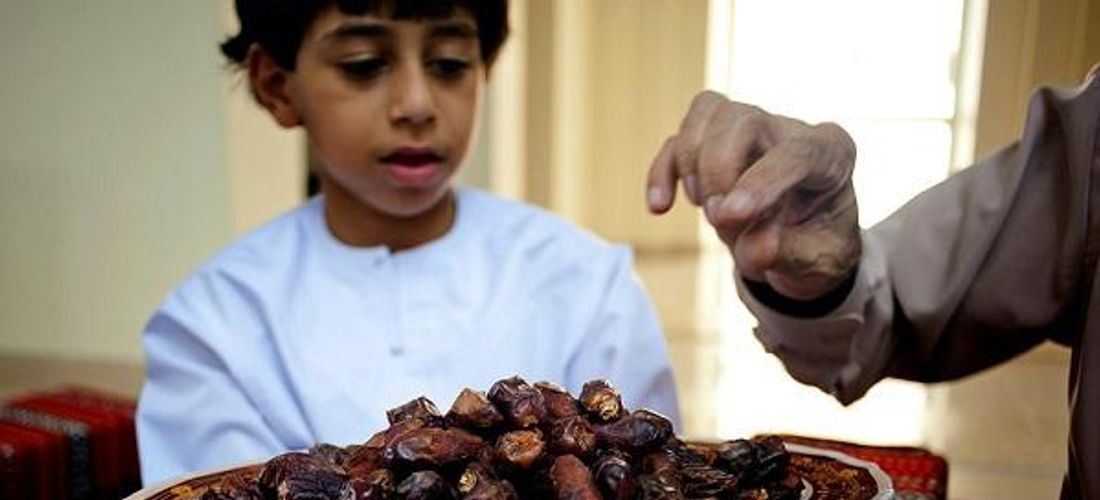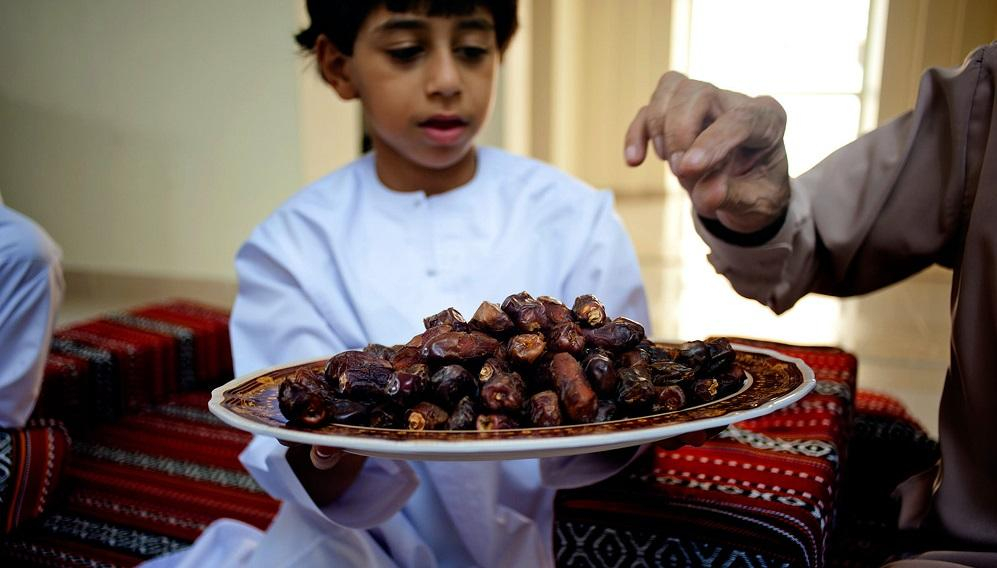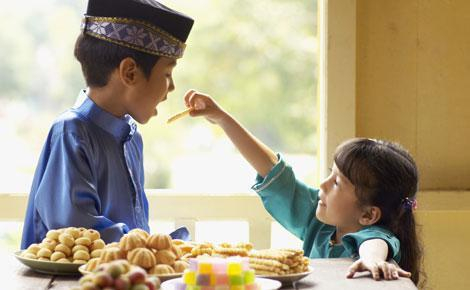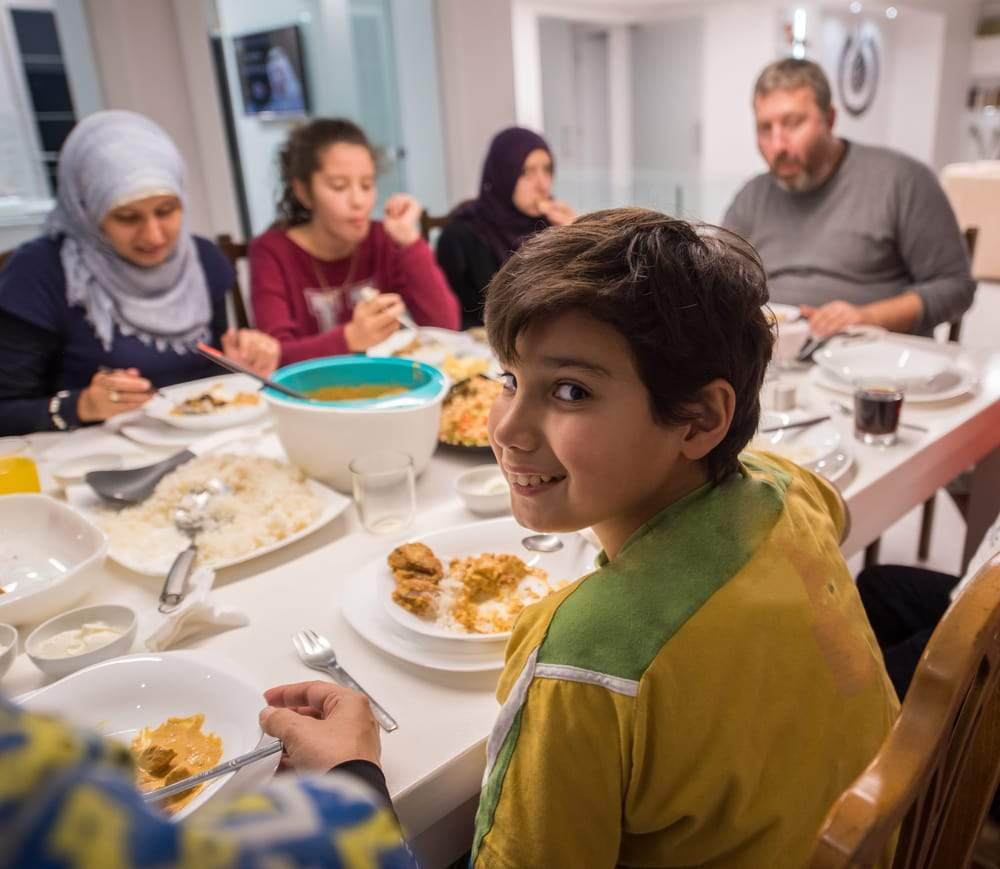When Should Children Start Fasting in Ramadan? (Hint: It's Not 'One Size Fits All')
Faith
|
May 5, 2020
|
7 MIN READ

By Nargis Rahman
My 10-year-old son sits at the dinner table fidgeting as he counts down the minutes until it’s time for iftar, and he can break his fast. Usually he’s fasting from 8 a.m. until 5 p.m. during the weekdays on school days and 10 a.m. until iftar time on the weekends. His days are usually filled with school (and other) work, which helps keep his focus off being hungry. This year however Ramadan fasting has been especially hard.
Some days he struggles with his allergies and needs to break his fast, while other days he feels hungry faster with less to do at home. His fasting is incumbent on how motivated he is with us, his family, rather than fasting with his peers at school or kids at weekend school. My seven-year old-daughter is practicing fasting longer hours this year as well. Last year she tried fasting for a few hours at school. This year she’s excited to fast with the adults and set the table during iftar.
The month of Ramadan is about elevating our ibadat (worship) and fasting from food and drink, of which the latter part becomes a big decision for kids and their parents. Deciding when your children should start to fast is a careful decision depending on many factors, like (for example), most schools being closed this year due to the COVID-19 pandemic.
But more than anything, it all depends on who you ask.

Image source: © Rich-Joseph Facun / Getty Images
When Kids Should Start Fasting?
With most children home from school this Ramadan, parents may choose to encourage children to fast. The age of seven is prescribed by many religious scholars to begin practicing (and parents enforcing) mandatory deeds like prayer and fasting – to start building up these fard (obligatory) acts of our faith so that they become a habit. In a hadith, the Prophet Muhammad, peace be upon him said, “Tell your children to pray when they are seven years old and discipline them if they don’t when they are ten years old.” (Ahmad)”
Shaykh Abdul Nasir Jangda of Qalam Institute explains that parents should use their knowledge of their children’s capabilities to determine when they should start practicing prayer and fasting, generally around the age of seven or eight, with consequences at age ten. However both prayer and fasting aren’t required or mandated until a child hits puberty. As children come in all different sizes, personalities and packages, so do their fasting journeys. Plus, one must consider what time of year fasting falls, as kids may come of age during long summer fasts or during the much shorter fasts of winter.
During the time of the Prophet Muhammad (saw), women would distract their kids with toys/games to encourage them to fast.
“Al-Rubayyi’ bint Mu`awwadh (may Allah (S) be pleased with her) said about fasting Ashura at the time when it was mandatory to fast it and not voluntary: “We used to make our young children fast, and we made them a toy made out of wool. If one of them cried (wanting) food, we would give him the toy to distract him until it was time to break the fast. (Al-Bukhari )”
Shaykh Abdul Nasir said scholars also generally agree that if a child does not begin puberty, then by the age of 15, fasting becomes required for them. In their complete guide to fasting, Seeker’s Guidance, an Islamic institution for learning, says, “If by the age of 15 lunar years neither male nor female has undergone these [puberty] experiences, then they are considered legally pubescent and are obliged to fast.”
So why do many kids start fasting (whether a full fast or a partial one) when they are younger? Because practicing and building up to full fasting teaches children how to do the obligatory acts way before it’s time so that it comes more naturally to them.
I was raised to understand that by age 10, kids should be doing all of the mandatory Islamic acts effortlessly. However the reality of this varies so much family to family. As a child, I began fasting at age seven upon my insistence that I wanted to. My parents were nonchalant about it and supported my decision. I grew up in a mostly non-Muslim school, however I attended a multicultural mosque where fasting was encouraged. I remember encouraging my younger siblings to try fasting by the age of seven as well.

My siblings and I fasted by the time we were seven or eight years old for about 20-30 days our first years. Now to be sure, Ramadan was during winter time of year, so the duration of the fasting day was much shorter (about eight hours) and therefore much easier.
However, I remember that not all my Muslim friends started fasting as young as me. By high school most of my friends were fasting with me, and there was a separate room for for fasting students to sit during lunch (we had about an 80 percent Muslim student population).
Not a ‘One Size Fits All’ Approach
By the time I had my own children, things were quite different. On my in-laws side, some religious acts are taken a lot more seriously, such as salah (daily prayer). Fasting, however, is on a sliding scale for the younger kids. I learned a lot about parenting from my sister-in-law, whom I lived with in a joint family for five years after I was married. She’s all about positive reinforcement.
Both of us had our kids start off on half-day fasts as early as when they were five-years-old. We wanted to build that excitement of fasting. While they were encouraged and called to wake up for suhoor or sehri (the pre dawn meal), they weren’t chided for not waking up. In fact, their dadi (paternal grandmother) would jump up in joy if they did wake up. (MuslimInc.com, a media platform for Muslims, provides these tips for getting your kids to start fasting.)
There are various ways to have kids fast half-days. For example, kids can eat breakfast when they wake up (not at suhoor time) and then keep the fast from then on until iftar. Or, some parents encourage their kids to eat suhoor and then fast until lunchtime. In my family, if the kid felt very hungry and exhausted, the child could break their fast, and we would talk it through with them. We’d mention it to all of our relatives, as a way of encouragement, when kids fasted, especially at iftar time.
Now that my family and I live on our own, I find myself falling back to the idea that kids should fast starting at seven, as much as possible. But again, I encourage it while being reasonable. They are kids, after all, and I want them to want to do it.
With my oldest, we wake him up for suhoor. He finds it difficult to fast through the long days at home during COVID because he’s constantly thinking about food. He’s been fasting since he was seven during the school days. (Many kids say it’s easier to fast in school because they are busy and don’t think about it too much.) Each year I email his teacher before Ramadan to let them know he’ll be fasting. I also tell his teachers that he can break his fast if he’s having difficulty. I send snacks and an emergency lunch with him, just in case!
His teachers have always been supportive, understanding and encouraging. One teacher wrote in 2017 in an email to me, “[He] is such a special boy. I applaud his courage and commitment to your religion. Please let me know if I can do anything else.” He attends a public school with about 100 Muslim students.
Now with a Ramadan in quarantine, I’ve found it much easier to regulate the fasting by letting them sleep in. Most days my 10-year-old son wakes up for suhoor. Some days he eats after he wakes up, around 11 a.m., and then fasts for the remainder of the day. It's still challenging for him, but sleeping in helps.

Although my son is doing homework for about one-two hours daily, during this Ramadan I’m more strict about spending free time doing Ramadan/Islamic-related activities. We also tend to do acts of worship, like reading the Quran and praying together/at the same time, to motivate them to make this a habit. (Soundvision.com has this list of tips on ways to encourage fasts when the kids are home.)
My younger daughter has a big breakfast around 10 or 11 a.m. and keeps her fast until iftar time, around 8:30 p.m. where we live in Michigan. She’s fasted two days so far. She is my picky eater, so I am constantly worried that she isn’t getting enough nutrients in. The days she chooses to fast, she will not break it even if she’s struggling.
My friends are also encouraging their kids to fast while home during the COVID-19 pandemic.
“My son, who turned eight, willingly made an intention to keep his fast today,” said Mafruza Shahin, a friend of mine. He woke up for suhoor, ate and prayed with us. He’s asking us tons of questions since the morning, especially about when we will be eating, LOL. He also asked, ‘Can a person die from not eating?’ LOL. Alhamdulillah for his effort.”
My friend Marzana Quayoum said, “My son is 10 and is keeping [his] fast and finds it easier to fast at home.”
Back at my house, breaking the fast together as a family is the highlight of the day. Despite not being able to break fast with their cousins, my kids are excited about Ramadan. The younger kids are thrilled they can stretch out their fasts while my oldest is struggling to keep up.
We have discussions about fasting, the virtues and values, to determine what makes the most sense for each kid. Whether that day the kids are fasting or not, some of our most precious family moments are sprawled over iftar, discussing how good the chicken biryani was that day or what rewards they hope to get in jannah.
Subscribe to be the first to know about new product releases, styling ideas and more.
What products are you interested in?

